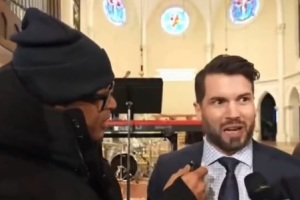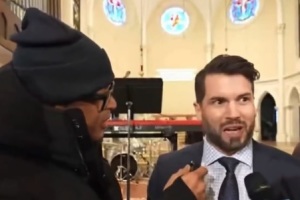How Churches Should Engage With the Political Sphere

With every election cycle, churches, their leaders, and congregants, face the same questions: Where do we fit into this debate? What positions should we take on the issues before us? What is our responsibility to our society? What are the limits of our engagement?
In light of changes in the way politics works in contemporary America, there is an even harder question: Does the church matter at all in the political sphere?
Professor Angelo Codevilla believes we have come again into an era when the "ruling class" sees itself as loftier than the common folk. The "power elites" believe they have the right to dominate, and when that assumed privilege is threatened, react swiftly.
Salena Zito, a journalist commenting on society and culture, says it has come down to this: "It's not about left vs. right, but about insider vs. outsider."
I would suggest that Codevilla's present "power elites" and Zito's "insiders" are the entertainment establishment (Hollywood), the information establishment (Silicon Valley), the academic establishment (the Ivy League and its clones), the political establishment (Washington and the tenaciously rooted deep state), and the corporate establishment.
The institutional church cannot be an "insider" because every time it has tried to achieve that status it has lost its identity as the ecclesia, the "called out," and the ministry that goes with it.
Codevilla writes: "In our time, the most widespread of differences between rulers and ruled is also the deepest: The ruled go to church and synagogue. The rulers are militantly irreligious and contemptuous of those who are not."
So where does the church fit? Should it try to be a "power elite"?
The answer is found in the prophetic literature of the Bible's Old Testament and in the life and ministry of Jesus Christ. A study of Scriptures show there are three roles the church—the body of Christ—is to play midst the tumultuous politics of our time.
The first is that of the prophetic community. The purview of the prophet is truth. The prophetic commodity is the reality of the Kingdom of God—righteousness-justice, peace, and Spirit-given joy (Romans 14:17).
In a sense Nathan, who confronted David after his sin with Bathsheba, was an "insider" within the palace, but who was able to remain an "outsider" who could speak hard truth to the chief executive. Nathan shows that, while the "church" is not to be an "insider" institutionally, its people might become "insiders" for the sake of ministry.
The team of evangelical leaders surrounding President Trump can play a role like that now. They must not be swept off their feet by the aura of the presidency and Oval Office or the forceful personality of the man. Rather, they must keep the example of Amos, as well as Nathan, in view.
When Amaziah, a top aide to evil King Jeroboam, tells Amos not to prophesy in the "king's residence," Amos tells him that it was the Lord who took him away from his flock, and told him to prophesy—and prophesy he will despite Amaziah's orders.
The second position for the church in today's politics is as the priestly community. A "priest" represents people to God and God to people, according to one oft-used definition.
In this function, members of the body of Christ may enter the political process as candidates, campaign volunteers, and other roles. But they must see themselves as being in the "insider-outsider" role modeled by Nathan. Above all, they must not lose sight of the objective of functioning as a minister of God toward politicians, their followers, and teams.
Third, the church is to be present in political society as the pastoral community. One thinks of Jesus's outreach to Zacchaeus and His bringing Matthew the publican into His circle of apostles.
As one who has been heavily engaged in the political world I can bear witness that there is much pain there. Candidates, legislators, executives, judges, and all others in the bloody combat zones of political engagement need the followers of Jesus, whether ordained or not, to pray with them, counsel them, encourage them, and speak truth to them lovingly.
I remain grateful more than four decades later to the men of God who organized a prayer breakfast in the White House where I was a young aide, and brought me back to the lordship of Christ. I watched as they ministered as prophets, priests, and pastors to people caught up in the Watergate fury,
One of the greatest outcomes of their ministry was Chuck Colson and Prison Fellowship.
As Colson shows, above all, people in the political sphere need those who will point them to the Christ, who is "Wonderful Counselor," as well as "Mighty God"... "Everlasting Father"..."Prince of Peace." (Isaiah 9:6)
It should never be an ambition of the authentic church to be a "power elite." As the Middle Ages, and the worst examples of state churches demonstrate, that is the best way for the church to lose its authenticity as the body of Christ.
However, if she engages with the political sphere in the prophetic, priestly, and pastoral roles the church will minister, not with raw power, but with the authority of the Lord of lords and the King of kings Himself.


























